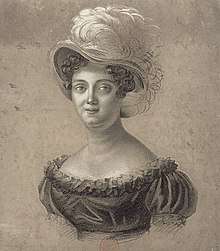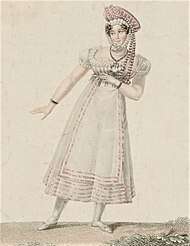Augustine Albert
Augustine Albert, also known as Augustine Albert-Himm (28 August 1791 – after 1846) was a French opera singer who sang leading soprano roles at the Paris Opéra from 1806 to 1823. Amongst the many roles she created in their world premieres was the title role of Spontini's Olimpie. Born in Paris and trained at the Conservatoire de Paris, she was also a principal singer of the Chapelle royale until 1830. She was married to Albert, danseur noble of the Paris Opéra.
Augustine Albert | |
|---|---|
 | |
| Born | Louise-Marguerite-Augustine Himm 28 August 1791 Paris, France |
| Died | after 1846 |
| Occupation | Opera singer (soprano) |
| Spouse(s) | Albert (François Decombe) |
Life and career
Albert was born Louise-Marguerite-Augustine Himm[lower-alpha 1] in Paris. She entered the Conservatoire de Paris in 1803 where she was a pupil of Charles-Henri Plantade. The following year she received the conservatory's first prize in singing and later studied with the castrato singer Girolamo Crescentini. She first appeared at the Paris Opéra in 1803 at the age of 12 as L'Amour (Cupid) in Cherubini's Anacréon. However, her official debut there came in 1806 when she sang Antigone in Sacchini's Œdipe à Colone.[2][3][4]
She went on to sing in the world premieres of multiple operas and also appeared in the leading soprano roles of many others, including Julia in La Vestale, Amazily in Fernand Cortez, and Eurydice in Orphée et Eurydice. After her marriage in 1811 to the dancer Albert, she performed under the name Augustine Albert. The couple had two children, a son Alexander, and a daughter Elisa, both of whom became dancers of some note but never achieved the fame of their father.[3][5]
For many years Albert was also a principal singer in the Chapelle royale of Louis XVIII and later Charles X. She retired from the Paris Opéra in 1823 but continued as a singer of the Chapelle royale until 1830 when she retired to Versailles. The date of her death is unknown, but she was still alive in 1846 according to an article on artists receiving pensions from the Paris Opéra in L'Album de Sainte-Cécile.[3][6]
Roles created

Roles created by Albert in their world premieres include:
- L'Amour in Anacréon (opéra-ballet in 2 acts) composed by Luigi Cherubini, libretto by C.R. Mendouze, premiered Paris Opéra, 4 October 1803[2]
- Galatea in Pimmalione (opera in 1 act) composed by Luigi Cherubini, libretto by Stefano Vestris; premiered Tuileries Palace, 30 November 1809[7][lower-alpha 2]
- Méala in Abel (opera in 3 acts) composed by Rodolphe Kreutzer, libretto by François-Benoît Hoffman; premiered Paris Opéra, 23 March 1810[9]
- Ériphile in Les amazones (opera in 3 acts) composed by Étienne Méhul, libretto by Étienne de Jouy; premiered Paris Opéra, 17 December 1811[10]
- Elvine in Pélage, ou Le roi et la paix (opera in 2 acts) composed by Gaspare Spontini, libretto by Étienne de Jouy; premiered Paris Opéra, 23 August 1814[10]
- Philis in Le Rossignol (opéra comique in 1 act) composed by Louis-Sébastien Lebrun, libretto by Charles-Guillaume Étienne; premiered Paris Opéra, 23 April 1816[11]
- Thémis and La Renommée in Les dieux rivaux ou Les fêtes de Cythère (opéra-ballet in 1 act) jointly composed by Berton, Kreutzer, Loiseau de Persuis and Spontini, libretto by Charles Brifaut and Armand-Michel Dieulafoy; premiered Paris Opéra, 21 June 1816 to mark the marriage of the Duke of Berry)[12]
- Zirphile in Zirphile et Fleur de Myrte (opéra-féerie in 2 acts) composed by Charles-Simon Catel, libretto by Étienne de Jouy; premiered Paris Opéra, 29 June 1818[10]
- Olimpie in Olimpie (opera in 3 acts) composed by Gaspare Spontini, libretto by Charles Brifaut and Armand-Michel Dieulafoy; premiered Paris Opéra, 22 December 1819[12]
Notes
- Her birth surname is sometimes spelled "Hymme" and less commonly, "Hymm" or "Hym".[1]
- The premiere was a private performance attended by Napoleon, who had commissioned the work. The title role was taken by Girolamo Crescentini, Albert's former teacher and a great favourite of the emperor. Venus was sung by Giuseppina Grassini, another of Napoleon's favourites.[7][8]
References
- Bibliothèque nationale de France. "Augustine Albert (1791-18..)". Retrieved 27 November 2019 (in French).
- Bellasis, Edward (1874). Cherubini, Memorials Illustrative of His Life, p. 135. Burns and Oates
- Kutsch, Karl-Josef and Riemens, Leo (2004). "Albert-Himm, Louise-Marguerite-Augustine". Großes Sängerlexikon (4th edition), p. 42. Walter de Gruyter. ISBN 359844088X (in German)
- Fétis, François-Joseph (1835). "Albert, Mme Augustine"' Biographie universelle des musiciens, Vol. 1, p. 37. H. Fournier (in French)
- Moore, Lillian (1965). "Bournonville's London Spring". Bulletin of the New York Public Library, Vol. 69, p. 570. Retrieved 29 November 2019.
- s.n. (20 July 1846). "Nouvelles". L'Album de Sainte-Cécile, p. 7. Original French: "La plus minime pension est payée à Mme. Albert, née Hym, et aujourd'hui femme dé M. Albert, l'ancien danseur de l'Opéra."
- Castil-Blaze (1833). "Cherubini". Revue de Paris, Vol. 52, p. 103 (in French)
- Somerset-Ward, Richard (2004). Angels and Monsters: Male and Female Sopranos in the Story of Opera, 1600-1900, p. 83. Yale University Press. ISBN 0300099681
- Pitou, Spire (1985). The Paris Opéra: Rococo and Romantic, 1715-1815, p. 17. Greenwood Press. ISBN 0313243948
- Jouy, Étienne de (1823). Oeuvres complètes d'Étienne Jouy, Opéra Vol. 1, pp. 184, 293, 320. Jules Didot (in French)
- Lebrun, Louis-Sébastien (1816). Le Rossignol, p. 8. Retrieved 27 November 2019 (in French).
- Casaglia, Gherardo (2005). "Augustine Albert-Himm". Almanacco Amadeus. Retrieved 27 November 2019 (in Italian).
![]()